In the book of Nehemiah we read about how the Israelites returned from captivity to rebuild the walls of Jerusalem. They came with the blessing of King Artaxerxes, but not everyone was glad that Israel was returning to their land to rebuild Jerusalem and its walls. There were enemies in the land of Israel who sought to destroy and kill the Israelites, and keep them from returning to the land God had given to them.
Nehemiah was aware of these enemies, and so as he assigned tasks and went about overseeing the rebuilding of the walls, he instructed the workers to strap a sword to their side so that if enemies appeared, they could defend themselves in battle (Neh 4:18).
 As we go about our own work as Christians, we too must keep a sword strapped to our side. Not a sword made from steel with which to kill other people—for our struggle is not against flesh and blood—but a spiritual sword with which to demolish spiritual enemies and defend ourselves against all the wiles of the devil.
As we go about our own work as Christians, we too must keep a sword strapped to our side. Not a sword made from steel with which to kill other people—for our struggle is not against flesh and blood—but a spiritual sword with which to demolish spiritual enemies and defend ourselves against all the wiles of the devil.
The spiritual landscape is full of enemies. When Christians lay down their sword and neglect the study and application of Scripture, we end up losing ground to the devil when he comes in and attacks our work, seeking to stop us from building our spiritual walls, defending our moral borders, and rescuing the perishing in our midst.
So we must take up the sword and carry it with us as we follow Jesus into the world. Let us keep our swords at hand. Let us keep them polished and sharp. Let us know how to use them best.
This is the instruction we receive from Ephesians 6:17 as we look at the sword of the spirit. As with every other piece of armor, we will consider the sword in three ways. First, what the sword was and the way it was used by Roman soldiers in Paul’s day. Second, we will learn what the sword is for us as Christians in spiritual warfare. And third, we will discover how we can take up the sword for our use.
The Sword for the Soldier
 Everybody knows what a sword looks like. And we have likely all seen pictures or movies of Roman soldiers carrying their sword. The swords that were typically used in Paul’s day were made of iron, and were double-edged. Like many swords, they came to a point, had a hilt, and a guard to protect the hand of the sword bearer. The Roman sword also had a metal knob at the base of the hilt which could be used to bash an enemy in the face or head if needed.
Everybody knows what a sword looks like. And we have likely all seen pictures or movies of Roman soldiers carrying their sword. The swords that were typically used in Paul’s day were made of iron, and were double-edged. Like many swords, they came to a point, had a hilt, and a guard to protect the hand of the sword bearer. The Roman sword also had a metal knob at the base of the hilt which could be used to bash an enemy in the face or head if needed.
One surprising characteristic about the Roman soldier sword, however, was that the blade was only about 18 inches in length.
Typically, when we think of a sword, we imagine one that is about three to four feet long, such as those carried by European Medieval knights. If you had to choose between a sword that was 18 inches or three feet long, most people would choose the longer sword. But the Roman military preferred the shorter sword.
This was not because they did not have the longer swords. They did. The longer sword was called a rhomphaia or spathe, and was closer to what we would call a broadsword. It was six to eight feet long and was used to hack off the limbs and heads of enemy soldiers.
But due of its size and weight, it had to be used with two hands, which didn’t allow the soldier to hold a shield. And since they didn’t have the full metal armor like the knights had in the medieval times, a soldier without a shield left himself exposed to arrows and spears. So the longer sword was nearly useless for the close hand-to-hand combat style that was common in the days of the Roman Empire.
Therefore, the Roman soldiers were primarily trained in use of the short sword, called a machaira or gladius. This is the sword that Paul refers to here in Ephesians 6:17. This sword was light and could be maneuvered quickly and with ease. It also only required only one hand to use it, which allowed the soldier to carry a shield.
To make a machaira, or gladius, the blacksmith would take a soft core of steel and surround it with several layers of hardened steel. This allowed the sword to be strong enough to inflict serious damage, but also flexible enough to not snap or break in battle.
In training with this short sword, the soldier was taught to stab and thrust instead of cut or slash. The reason is because the cut, even delivered with force, frequently does not kill. It only wounds because of the protective armor and bone. But a stab nearly always penetrates into the body, and when thrust into the torso, as Roman soldiers were trained to do, they had a much higher probability of hitting a vital organ, thereby killing the enemy soldier instead of just wounding him.
This was the same for spears and pikes. While Roman soldiers did often carry spears and pikes, these were only used when the soldiers sought to advance their position against an enemy position. They would form up in a tight unit, which shields interlocked, and then advance forward while thrusting with their spears. Once they arrived at the desired position, they would use the short sword to hold the ground which they had just obtained.
In this way, the sword that Paul mentions here is primarily defensive.
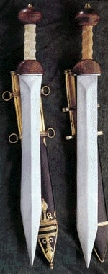 We would think that of all the pieces of spiritual armor, the sword would be the one piece with which the soldier could attack the enemy, but this is not really the case. Even here, as with all the other pieces of armor, the short sword was primarily used for defense. It was not used to advance against an enemy army, but was used to defend a position on the field of battle which had already been gained.
We would think that of all the pieces of spiritual armor, the sword would be the one piece with which the soldier could attack the enemy, but this is not really the case. Even here, as with all the other pieces of armor, the short sword was primarily used for defense. It was not used to advance against an enemy army, but was used to defend a position on the field of battle which had already been gained.
Yes, although the short sword could be used to attack enemy soldiers, it was only used this way when the enemy soldiers advanced upon position that the Roman soldiers sought to maintain. This fits perfectly with the basic Roman military strategy of standing their ground on the field of battle.
Remember, Paul has stated numerous times in the context that our number one task in spiritual warfare is to stand our ground. And now we have seen that for the Roman soldier, even the sword was used to simply stand their ground. It was not primarily a weapon for attacking or advancing, but was simply to defend the soldier as he stood his ground. This tell us a lot about how the sword works for the Christian on the field of spiritual battle.
The Sword for the Christian
What is the sword for the Christian? Paul explains what it is in two ways. First, Paul states that this is the sword of the Spirit, and then secondly, Paul goes on to clarify that the sword is the Word of God. Some have confused Paul’s statement here by thinking that the sword is the Spirit; but it isn’t. Paul clarifies that the sword we use in spiritual battle is the Word of God.
But what is the Word of God?
Though the previous paragraphs have been referring to Scripture, the Word of God, as Paul writes of it here, is not precisely the same thing as the Bible. You see, many people think they have the sword of the Spirit if they have a Bible. But Paul does not agree. You do not have the sword of the Spirit if you own a Bible. You do not take up the sword of the Spirit by having possession of a Bible. We will discuss next about how to take up the sword of the Spirit, but in leading up to that, it is important to recognize that Paul does not use the normal term here for the Word of God.
Typically, when biblical authors want to refer to written Scriptures, they either use the term graphē, which means “writings,” or they use the term logos, which means “word.” Both terms refer to Scripture, in its entirety, as it was originally written down on paper by the original authors.
 The graphē, the writings, or the logos, the Word of God, refers to what we call the Bible, as a written revelation from God. It is important to note that the second term, logos, can also refer to Jesus as the living, incarnate Word of God (cf. John 1:1-11). There is a written logos, the Bible, and a living Logos, Jesus, and both are divine revelations from God.
The graphē, the writings, or the logos, the Word of God, refers to what we call the Bible, as a written revelation from God. It is important to note that the second term, logos, can also refer to Jesus as the living, incarnate Word of God (cf. John 1:1-11). There is a written logos, the Bible, and a living Logos, Jesus, and both are divine revelations from God.
So which terms does Paul use here in Ephesians 6:17? Neither.
Instead, Paul uses the Greek word rhēma. This term differs from graphē and logos in that while these latter two terms refer to the entire written Word of God, rhēma refers to speaking individual verses or passages from Scripture to help or aid in a particular circumstance or situation.
This is how Paul used the word in Ephesians 5:26 when he wrote about the washing of water with the word. The written Scriptures do not cleanse us or wash us unless they are spoken to use and applied to our lives.
So while logos is the written Word of God, rhēma is when the written words of Scripture are spoken into our lives for encouragement, instruction, and correction. As Harry Ironside said: “The Bible is not the sword of the Spirit, it is the armory. There are thousands of swords in [the Bible] and every one of them is powerful and two-edged.”
If Paul meant that the sword of the Spirit was the Bible—he would have used the word logos. But he didn’t. He used the word rhema, which shows us that the sword of the Spirit is the individual verses and phrases and passages of the Bible which we can wield quickly in battle. The individual statements, promises, and truths of Scripture are useful for stabbing and thrusting into the weak spots of our enemy attackers.
Every time you memorize a verse, you have added another sword to your arsenal. Every time you learn a new truth about a verse, you have sharpened the blades on that sword. Every time you learn a new way to apply a verse, you have become quicker and more deadly in using that sword. This is why practice is needed in correctly handling and rightly dividing the word of truth (2 Tim 2:15). And when we practice using Scripture, the Word of God becomes powerful and effective.
It can destroy Satan’s arguments and defend us against his temptations (Matt 4:1-11). Remember, this is how Jesus defeated the temptations of the devil in the wilderness. When Satan came at Jesus with three temptations, Jesus used verses from Scripture as a way to fend of the attacks of the devil. We can do the same thing.
Paul writes in 2 Corinthians 10:3-5 that the Word of God helps us tear down enemy strongholds and the false and deceptive teachings spread by Satan. So you need to know the Word of God to defeat the enemy.
The Word of God can also pierce men’s hearts and show them the truth about their own sin and the only way of salvation through faith in Jesus Christ. (Jer 23:29; Acts 2:37; Heb 4:12; Rom 10:17). When we share the Gospel with people, we need to use Scripture. Witnessing without the use of the Word is like trying to win a battle without a sword. The Spirit uses the Word of God to convict sinners and convince them of their need of Jesus Christ (John 16:7-11).
It provides comfort, encouragement, instruction, and correction as Christians (Mark 4:20; 1 Thess 2:13; 2 Tim 2:15; 3:16–4:4; 1 Pet 1:23–2:2). It is like a scalpel, carefully cutting away all the dead flesh and scar tissue that is left behind from our old way of life. It is a knife that cuts the bonds of sin that trip us up and drag us down. But it is also milk and meat (1 Cor 3:2; Heb 5:12; 1 Pet 2:2), providing us with sustenance and energy to grow strong in the Lord and in the power of His might.
The Word of God does all of these things and more for the Christian who knows how to use it. And since it does all of these things—keeping the enemy at bay, helping us bring light to sinners, showing us how to become more Christlike, the Word of God should be our constant companion. Like a sword, Scripture should always at our side, as a ready defense in times of need.
And just like the people of Israel in the days of Nehemiah as they went about rebuilding the walls of Jerusalem, we need to make sure we always have our sword at our side, as we go about our days and do whatever it is Jesus has called us to do in life. Toward this end, let us consider a few brief ways to take up the sword as a Christian on the field of battle.

Taking up the Sword
Since the Sword of the Spirit is made of the individual promises and truths of Scripture, this means that the only way to take up the sword of the Spirit is to become familiar with the Scriptures.
The only way to arm ourselves with the word of God is to memorize, study, and learn the word of God. We must practice using the Scriptures. We must drill with the Bible. Through endless repetition and training, must learn the forms and stances of the Bible.
 We must exercise with the Bible until it is stamped into our minds, so that when it is needed, our muscle memory kicks in and the use of the sword becomes second nature and automatic.
We must exercise with the Bible until it is stamped into our minds, so that when it is needed, our muscle memory kicks in and the use of the sword becomes second nature and automatic.
There are no short cuts or fast tracks. The only way to take up the Sword of the Spirit is to spend as much time as you possibly can in the word of God. Read it. Study it. Memorize it. Talk about it. Meditate upon it. Pray through it.
Think about it.
Just as the Roman soldiers spent hours every day drilling with their sword, so also, we must spend plenty of time drilling with ours. This is the only way to take up the sword of the Spirit so that it is ready and available on the field of spiritual warfare.
When I was younger, my parents sent me to summer Bible camp, and one of the activities I remember from this Bible camp were the “Sword Drills” as part of the chapel time. During the sword drill, the camp director stood up in front of the chapel, would shout “Bibles High!” and all of us would raise our Bibles into the air. Then he would shout a verse reference, such as “Ephesians 2:8!” and we would shout the verse reference back to him. Then, after a small pause, he would shout “Charge!” and we would all pull our Bibles out of the air and frantically flip through our Bibles for Ephesians 2:8. The first person to find it would stand up and read it. If they were right, they would get some points for their team. These sword drill were an early way of teaching us to use our Bible and find the swords within them.
It would be helpful, I sometimes think, for adults to do similar sorts of sword drills, but rather than trying to find Bible verses within the pages of Scripture, we would be invited to discuss what sorts of truths or ideas the Bible contains which would help us in the various temptations and troubles that life throws our way.
 We could sit in a circle and say, “Very often, we feel like God does not love us and cannot forgive us for some sin we have committed. What truths or verses in Scripture can remind us of God’s infinite love and complete forgiveness?” (Some possible answers: John 3:16; Rom 5:8; 8:38-39; 1 John 2:1-2; 4:7-10).
We could sit in a circle and say, “Very often, we feel like God does not love us and cannot forgive us for some sin we have committed. What truths or verses in Scripture can remind us of God’s infinite love and complete forgiveness?” (Some possible answers: John 3:16; Rom 5:8; 8:38-39; 1 John 2:1-2; 4:7-10).
Or someone could propose this: “A Jehovah’s Witness has just knocked on your door, and he is telling you that Jesus Christ was just a god, but He was not the one and only God. Where would you turn in Scripture?” (Answer: John 1; Mark 2; Luke 18). Or someone could say, “A coworker has gone through some troubling times in her life, and she walks up to you some day, and says, ‘You’re a Christian right? What must I do to get to heaven?’” What would you tell her? (Answer: John 3:16; 5:24; 6:47; 1 John 5:11-13).
Through such sword drills, we are training and practicing with the sword of the Spirit, learning to defend ourselves against the lies and deceptions of the devil. Through such practice with our sword, we are preparing to give an answer to anyone who asks about the hope we have in Jesus Christ (1 Pet 3:15).
We must know the Bible well enough so that we are ready for any challenge that comes our way. We must take it up in the morning, take it up on our lunch break at work, take it up at night with our family, and take it up as the last thing we do before bed.
Many Christians are weak and ineffective at defending themselves against the attacks of the devil because they have no skill with their sword. We might have the shiniest armor, the newest sandals, a perfect leather belt, and a helmet with no dents or rust, but if they cannot handle the word of truth, then Satan can press his attack with no though of getting harmed or chased off. He can take his sweet time in wearing us down until we fall to the ground from fatigue.
To truly stop the attacks of the devil, we must defend ourselves with a counter-attack, which we can only do with the sword of the Spirit. As we resist the devil in this way, he will flee from us, just as he fled from Jesus (Jas 4:7).
So what can you do? Study Scripture. Memorize Scripture. Learn what the Bible says and apply it to your life. Attend a Bible study. Read books and articles about the Bible. Listen to good teachings about the Bible on the radio or through podcasts.
 And you must keep immersing yourself in Scripture, day in and day out, so that you know what the Scripture says and how to apply its promises to your life when lies and deceptions of the devil start to tear you down. If you want to have your sword with you in spiritual battle, you need to be skilled with the Word of God. And the only way to gain skill in Scripture is to practice using Scripture as much as possible.
And you must keep immersing yourself in Scripture, day in and day out, so that you know what the Scripture says and how to apply its promises to your life when lies and deceptions of the devil start to tear you down. If you want to have your sword with you in spiritual battle, you need to be skilled with the Word of God. And the only way to gain skill in Scripture is to practice using Scripture as much as possible.
Roman soldiers knew that their skill with the sword was their lifeline in battle. The better you were with your sword, the greater your chances were of survival. And so that is why the best soldiers spent almost all of their free time practicing with the sword.
The same is true for you.
Spend as much time in the Bible as you can. Fight the good fight. Become heroes of the faith. Take up the sword of the Spirit, which is the Word of God. In this way, you will be able to stand our ground against our enemy the devil for the praise and glory of our commander and chief—Jesus Christ.
 Do you want to learn about spiritual warfare and how to put on the full armor of God? If you want to defeat sin and gain victory in your life over temptation so you can better follow Jesus, take my course on the Armor of God as it is explained in Ephesians 6:10-20.
This course costs $297, but when you join the Discipleship group, you can to take the entire course for free.
Do you want to learn about spiritual warfare and how to put on the full armor of God? If you want to defeat sin and gain victory in your life over temptation so you can better follow Jesus, take my course on the Armor of God as it is explained in Ephesians 6:10-20.
This course costs $297, but when you join the Discipleship group, you can to take the entire course for free.



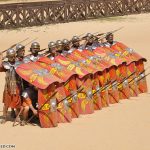
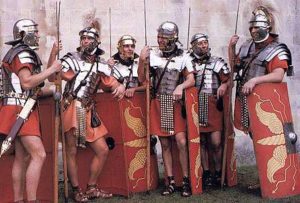
 Remember, the strength and genius of the Roman military was their ability to stand firm and stay in once place on the field of battle, defending their small piece of land from any and all attackers. The shield served a significant role in this strategy.
Remember, the strength and genius of the Roman military was their ability to stand firm and stay in once place on the field of battle, defending their small piece of land from any and all attackers. The shield served a significant role in this strategy.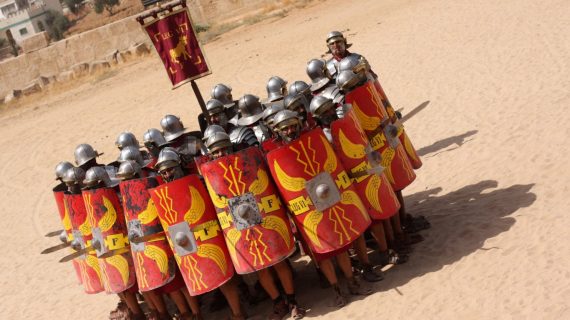
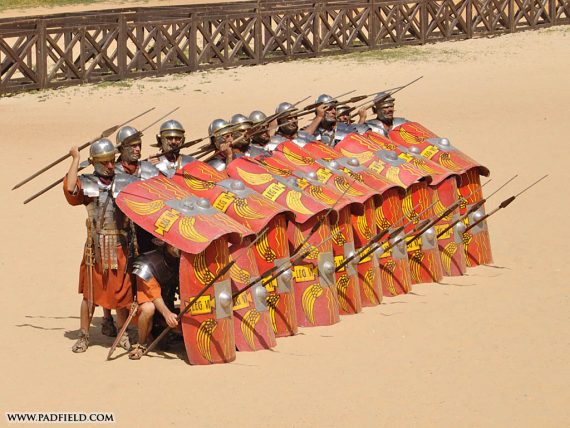
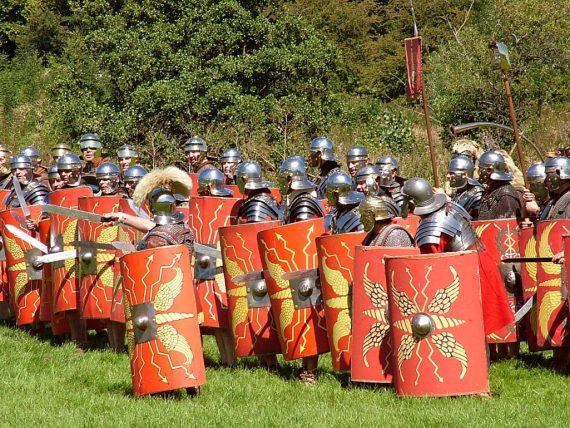

 Faith, as taught in the Bible, can be defined as a reasonable certainty about any truth claim or statement of fact.
Faith, as taught in the Bible, can be defined as a reasonable certainty about any truth claim or statement of fact.
 When temptations do get through, and when we get wounded by the fiery darts of the devil, it is because we have dropped our shield. The only way the fiery darts of temptation get past the protective shield of God is when we have not properly taken up the shield of faith, as Paul instructions in Ephesians 6:16. When the shield drops, when we let down our guard, it is then that the fiery darts are able to get through and wound us.
When temptations do get through, and when we get wounded by the fiery darts of the devil, it is because we have dropped our shield. The only way the fiery darts of temptation get past the protective shield of God is when we have not properly taken up the shield of faith, as Paul instructions in Ephesians 6:16. When the shield drops, when we let down our guard, it is then that the fiery darts are able to get through and wound us. So to grow our faith, to walk by faith, to live by faith, and to take up the shield of faith, we must begin with the facts and truths we know to be true, and then build upon these ideas with more truths and ideas from Scripture.
So to grow our faith, to walk by faith, to live by faith, and to take up the shield of faith, we must begin with the facts and truths we know to be true, and then build upon these ideas with more truths and ideas from Scripture. Do you see? As we come to learn and believe these promises of God, they become a shield and a barrier protecting us from all the lies of the devil.
Do you see? As we come to learn and believe these promises of God, they become a shield and a barrier protecting us from all the lies of the devil.
 The first part of the battle plan is to put on the whole armor of God. Paul states this instruction twice in Ephesians 6:11, 13 when he writes, “Put on the whole armor of God” and “take up the whole armor of God.”
The first part of the battle plan is to put on the whole armor of God. Paul states this instruction twice in Ephesians 6:11, 13 when he writes, “Put on the whole armor of God” and “take up the whole armor of God.” Along with three main types of temptations, there are also three main targets for these temptations. There are three areas that Satan is constantly trying to undermine and destroy. These three targets are the church, the family, and your own personal life.
Along with three main types of temptations, there are also three main targets for these temptations. There are three areas that Satan is constantly trying to undermine and destroy. These three targets are the church, the family, and your own personal life. He raises doubts in our minds about the truth of Scripture. He twists and perverts what the Bible says. He makes subtle changes to the Word of God. He adds to the Word of God, or subtracts from the Word of God. He rips verses out of context from the Word of God. He exaggerates the strictness of the boundaries in God’s Word. He denies the consequences of disobeying God’s Word. He distorts the supreme revelation of God in Jesus Christ to make us think that Jesus reveals the opposite of what He actually did reveal.
He raises doubts in our minds about the truth of Scripture. He twists and perverts what the Bible says. He makes subtle changes to the Word of God. He adds to the Word of God, or subtracts from the Word of God. He rips verses out of context from the Word of God. He exaggerates the strictness of the boundaries in God’s Word. He denies the consequences of disobeying God’s Word. He distorts the supreme revelation of God in Jesus Christ to make us think that Jesus reveals the opposite of what He actually did reveal. When people recognize that Satan is real, Satan tries to get them to think that he is equal with God.
When people recognize that Satan is real, Satan tries to get them to think that he is equal with God.
 But the Christian who truly steps out to follow Jesus into the dark and hellish places of earth will experience great difficulties, trials, and roadblocks in life. Such Christians will be called to love those they would rather hate, to forgive those who deserve nothing but death, to be patient with those who are rude and condescending, and to serve those who are the least enjoyable to be around.
But the Christian who truly steps out to follow Jesus into the dark and hellish places of earth will experience great difficulties, trials, and roadblocks in life. Such Christians will be called to love those they would rather hate, to forgive those who deserve nothing but death, to be patient with those who are rude and condescending, and to serve those who are the least enjoyable to be around. Therefore, since Christians who seek to follow Jesus into this world will face the resistance and struggles of spiritual warfare, it is imperative for Christians to know what is involved in spiritual warfare and how we can prepare ourselves to stand in the midst of this struggle.
Therefore, since Christians who seek to follow Jesus into this world will face the resistance and struggles of spiritual warfare, it is imperative for Christians to know what is involved in spiritual warfare and how we can prepare ourselves to stand in the midst of this struggle. The movie “Hacksaw Ridge” is a true story about Private Desmond Doss. He was drafted into the army for World War II, but since he was a pacifist, he refused to carry a gun or shoot others. However, he wanted to serve his country and do his part. He ended up earning the Congressional Medal of Honor for saving 75 fellow soldiers in the Battle of Okinawa, all without firing a single shot.
The movie “Hacksaw Ridge” is a true story about Private Desmond Doss. He was drafted into the army for World War II, but since he was a pacifist, he refused to carry a gun or shoot others. However, he wanted to serve his country and do his part. He ended up earning the Congressional Medal of Honor for saving 75 fellow soldiers in the Battle of Okinawa, all without firing a single shot. The reason is that although we are plugged into the power of God, there are things in our life that restrict its flow. Picture your life as a spiritual fuse box.
The reason is that although we are plugged into the power of God, there are things in our life that restrict its flow. Picture your life as a spiritual fuse box. After taking their oath of service, they were branded or marked with the letters SPQR, which was a Latin acronym showing that the soldier belonged to the “Senate and People of Rome.”
After taking their oath of service, they were branded or marked with the letters SPQR, which was a Latin acronym showing that the soldier belonged to the “Senate and People of Rome.”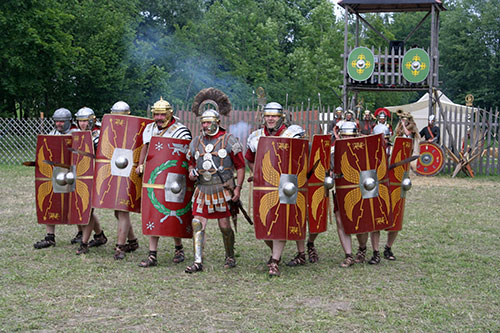
 This is not physical strength Paul has in mind, but spiritual. He wants us to exercise and work out spiritually. But just as with physical body building, spiritual strength training does not happen naturally. You do not become physically strong by sitting in a couch watching TV, and you do not become spiritually strong by sitting in a pew watching a Bible teacher. You will only become strong by getting up and engaging in strenuous spiritual activity.
This is not physical strength Paul has in mind, but spiritual. He wants us to exercise and work out spiritually. But just as with physical body building, spiritual strength training does not happen naturally. You do not become physically strong by sitting in a couch watching TV, and you do not become spiritually strong by sitting in a pew watching a Bible teacher. You will only become strong by getting up and engaging in strenuous spiritual activity.![[#40] Genesis 3:1-5 – Eve and the Serpent](https://redeeminggod.com/wp-content/uploads/2016/06/The_Serpent_eve-150x150.jpg)


